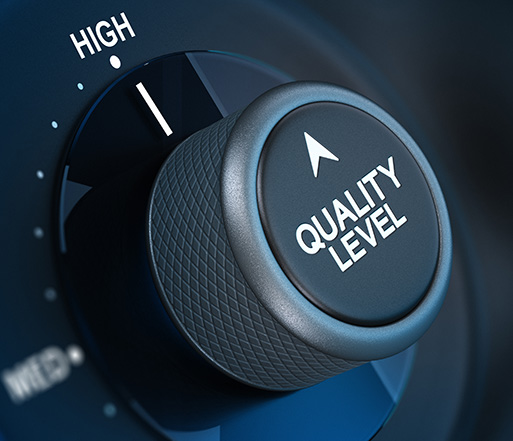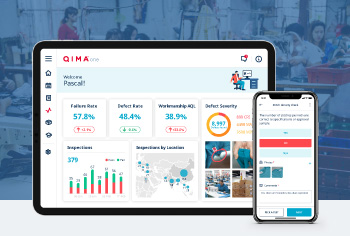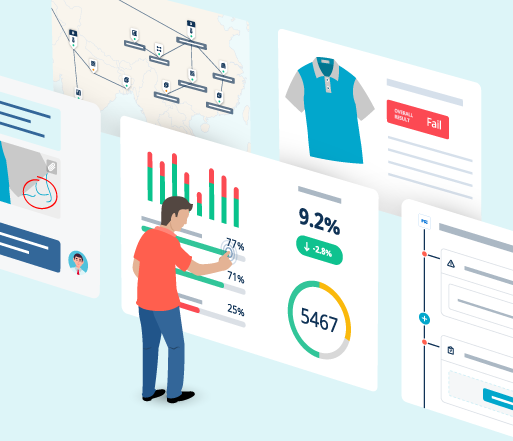
Article
Practical steps to embrace the digital revolution of traditional quality control

Article
Practical steps to embrace the digital revolution of traditional quality control
Article
Practical steps to embrace the digital revolution of traditional quality control

Keep up-to-date with the latest supply chain insights.
In 1989, China introduced massive privatization. A short time later, China continued its transformation and joined the WTO. These changes brought China onto the world manufacturing stage and allowed Chinese businesses to trade in the global market.
The companies that moved production to China often brought with them old-fashioned methods of monitoring the quality of the products they made. These methods often cause bigger problems than they solve. Consider these typical quality control problems caused by outdated, pen and paper types of processes:
- Lost and inefficient communication
- Non-standardized inspection reports that are difficult to analyze
- Inefficient, ineffective, and inaccurate inspections
- Reporting delays
- Reactive approaches to product defects that don’t initiate correction
- Laborious data collection
Despite the industry's best efforts, traditional quality control increases the risk of unexpected defects and ineffective audits. But it doesn’t need to stay that way.
In the early 2000s, new technology created a shift from quality control to quality assurance. That technology has continued to transform the quality control industry, and today, we find ourselves in an age of empowerment and accountability. Brands and retailers now use digitized supply chains to collaborate productively with their production partners to deliver continuous growth and improvement.
The Benefits of Digitizing Quality Control
Adopting a digital quality control solution benefits all stakeholders in a company's supply chain, from brands and retailers to vendors and factories.
For Brands and Retailers
It allows companies to capture data and validate whether that data is accurate and reliable in real-time. A quality manager can monitor an inspector's work and receive a report immediately after the inspection. This real-time quality control creates a high level of efficiency for supply chains, freeing time and resources for companies to complete more audits in less time.
With traditional quality control, it took significant time and resources to collect and analyze supply chain data. With modern digital systems, brands and retailers can analyze supply chains in real-time, get immediate results from inspections, and implement corrective actions in the event of failures.
This increase in efficiency and transparency from digital quality assurance platforms like QIMAone gives brands and retailers a significant competitive advantage.
For Vendors and Factories
Rather than filling out quality control forms with pencil on paper, quality control platforms make those forms standardized and simple. Gone are the days of lost paperwork and bad penmanship. The software makes decision-making easy by relaying data back to management. Businesses can now spend more time focusing on production and making the daily decisions that make customers, and the bottom line, happy.
Vendors and factories that adopt a digital quality control platform can put clients at ease with real-time data on quality control and production issues. This real-time data allows factories to collaborate with clients to find solutions quickly and efficiently.
5 guidelines to help you choose your Quality Management Software
Download your guide
5 guidelines to help you choose your Quality Management Software
Download your guideHow to Begin Digitizing Your Quality Control Systems
1) Onboard your supply network
With all your stakeholders in one place, you can streamline communication, standardize your quality assurance programs, and optimize resources.
2) Leverage the power of data
With a digital platform like QIMAone, you can gather data at every touchpoint of your supply chain. This data, combined with intelligent machine learning, allows you to predict risk and automate tasks, saving you time while minimizing costs.
3) Think long-term
The retail world moves fast, and to stay competitive, you must innovate. The digitization of quality control systems is not a one-off implementation but a process of constant innovation and improvement. According to a recent QIMAone survey, businesses with low supply chain digitization are twice as likely to suffer disruptions from suppliers and production partners. In other words, the investment in your supply chain today will almost certainly pay off tomorrow.
4) Rely on proven experts
When choosing quality control software, look for a reliable solution from experts with in-depth quality control expertise. Implementing a new system will require updating your current processes. With well over 2,000 inspectors worldwide, QIMA has helped over 14,000 businesses to develop better, safer products. QIMAone utilizes hundreds of industry-proven checklists with a support team of quality control experts.
Digital platforms like QIMAone are revolutionizing how businesses manage quality and compliance with their factories while providing unprecedented efficiency and transparency for brands and retailers. Embracing this technology will enable companies to provide better quality and service to their customers.
Schedule a demo today to learn more about how QIMAone can power you towards a data-driven supply chain.
Most Popular Articles
Corrective Action Plans 101: Your Basic Guide to Ensuring Supply Chain Quality Excellence
The Benefits of a Data-Driven Supply Chain
6 Benefits of Supply Chain Visibility
How to Implement a Quality Management System
Simpli Home: Ensuring product quality and compliance with supply chain technology
7 Effective Ways to Improve Your Quality Management System
Supply Chain Visibility: Complete Guide for Supply Chain Managers
Boost Quality Control with Supplier Performance Metrics





